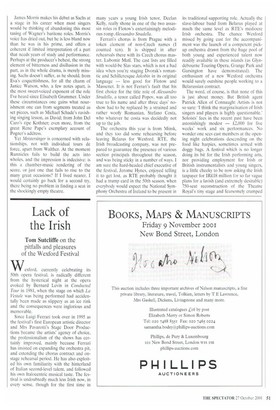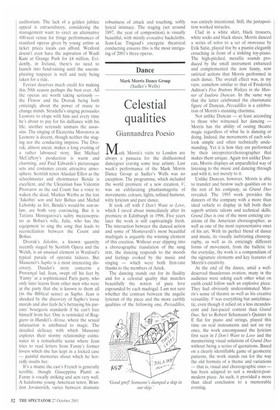Lack of the Irish
Tom Sutcliffe on the pitfalls and pleasures of the Wexford Festival
Wexford, currently celebrating its 50th opera festival, is radically different from the hysterical night at the opera evoked by Bernard Levin in Conducted Tour in 1981, when the stage on which La Vestale was being performed had accidentally been made as slippery as an ice rink and the consequences were inglorious and memorable.
Since Luigi Ferrari took over in 1995 as the festival's first European artistic director and Mrs Pavarotti's Stage Door Productions became the artists' agency of choice, the professionalism of the shows has certainly improved, mainly because Ferrari has insisted on expanding the orchestra pit, and extending the chorus contract and onstage rehearsal period. He has also exploited his own familiarity with the hinterland of Italian second-level talent, and followed his own Italocentric musical taste, The festival is undoubtedly much less Irish now, in every sense, though for the first time in auditorium. The lack of a golden jubilee appeal is extraordinary, considering the management want to erect an alternative 400-seat venue for fringe performances of standard operas given by young artists at ticket prices locals can afford. Wexford doesn't even have the aspiration of Wasfi Kani at Grange Park for £4 million. Evidently, in Ireland, there's no need to launch into fund-raising until the uncomplaining taxpayer is well and truly being taken for a ride.
Ferrari deserves much credit for making this 50th season perhaps the best ever. All the operas are worth taking seriously — the Flotow and the Dvorak being both enticingly about the power of music to change minds. Stradella's singing persuades Leonore to elope with him and every time he's about to pay for his dalliance with his life, another serenade unmans the assassins. The singing of Ekaterina Morozova as Leonore is decent, though neither the staging nor the conducting impress. The Dvorak, almost uncut, makes a long evening of a rather laboured story. But Michael McCaffers,,,'s production is warm and charming, and Paul Edwards's picturesque sets and costumes create attractive atmosphere. Scottish tenor Alasdair Elliot as the schoolmaster and choirmaster Benda is excellent, and the Ukrainian bass Valentin Pivovarov as the sad Count has a voice to waken the dead. Markus Werba as the lost lakobin. son and heir Bohus and Michal Lehotsky as Jiri, Benda's would-be son-inlaw, are both very convincing. But it is Tatiana Monogarova's sultry mezzosoprano as Bohus's wife, Julie, who has the equipment to sing the song that leads to reconciliation between the Count and Bohus.
Dvorak's Jakobin, a known quantity recently staged by Scottish Opera and the Welsh, is an unusual element in Wexford's typical parade of operatic failures. But Massenet's Sapho is a most interesting discovery. Daudet's story concerns a Provençal lad, Jean, swept off his feet by 'Fanny' at a sophisticated Paris party, who only later learns from other men who were at the party that she is known to them all (in the Biblical sense) as Sapho. Jean is shocked by the discovery of Sapho's loose morals and also feels he's betraying his parents' bourgeois standards if he can't free himself from her. One is reminded of Ruggiero in Handel's Alcina, where the sexual infatuation is attributed to magic. The detailed delicacy with which Massenet explores their stormy relationship culminates in a remarkable scene where Jean tries to read letters from Fanny's former lovers which she has kept in a locked case — painful memories about which he horridly insults her.
It's a shame the cast's French is generally terrible, though Giuseppina Piunti as Fanny is vocally striking and acts very well. A handsome young American tenor, Brandon Jovanovieh, varies between dramatic robustness of attack and touching, softly lyrical intimacy. The staging (set around 1897, the year of composition) is visually beautiful, with mistily evocative backcloths. Jean-Luc Tingaud's energetic theatrical conducting ensures this is the most intriguing of 2001's three operas.











































































 Previous page
Previous page